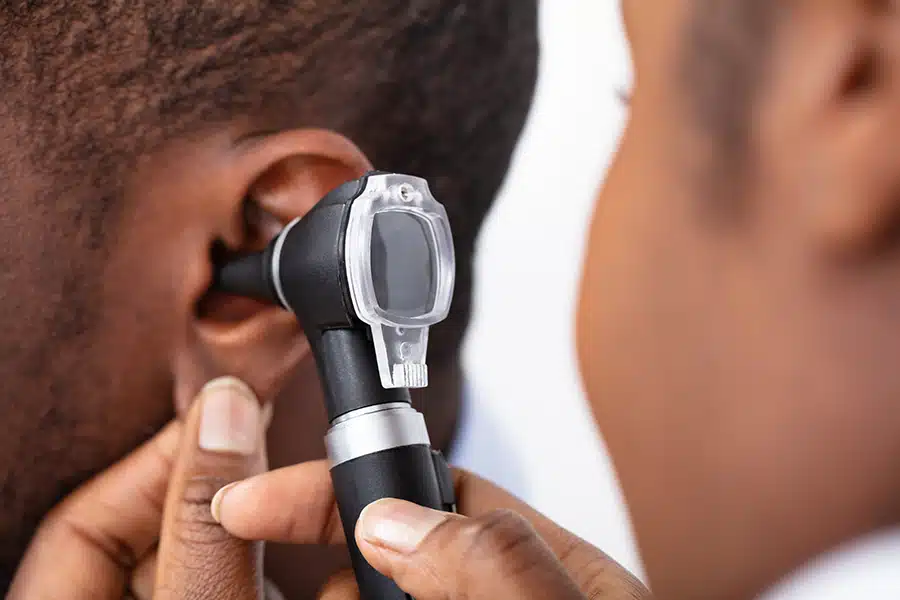If you work in a loud environment or on a noisy job site, you could be at risk of occupational hearing loss. Losing your hearing — whether temporarily or permanently — is not only disorienting, but it can also greatly impact your ability to earn a living and provide for your family. Even though employers are required to provide protections against occupational hearing loss, it can still occur. Here’s what you need to know about hearing loss on the job.
Types of Occupational Hearing Loss

The ear is composed of three sections: inner, middle, and outer. When damage occurs to any parts of these sections, it can result in hearing loss. There are multiple levels and types of hearing loss, but for the sake of workers’ compensation claims, the Washington State Department of Labor and Industries (L&I) views hearing loss as either an injury (conductive hearing loss) or occupational illness (sensorineural hearing loss):
- Conductive hearing loss is typically caused by a single event, such as an explosion or head injury, which damages the outer or middle ear and results in temporary or permanent hearing loss. In mild cases, it will heal on its own, but more serious cases will require treatment and/or hearing devices.
- Sensorineural hearing loss affects the inner ear and typically happens over time but can occur suddenly, leading to partial or total hearing loss. Generally, this type of hearing loss cannot be reversed and is treated with hearing aids.
Signs and Symptoms of Occupational Hearing Loss
Many factors affect job-related hearing impairment, including loudness, pitch, the length of a worker’s exposure to noise, and patterns and frequency of using ear protection (such as headsets or ear plugs). Employees who are exposed to high levels of noise in the workplace should take measures to protect their ears and look for the following signs of potential occupational hearing loss:
- Muffled or distorted sound
- Difficulty hearing high-pitched noises
- Ringing or roaring sounds in one or both ears
- Difficulty understanding others during conversation
- Dizziness or balance issues
How Noisy Is Your Workplace?
Ongoing exposure to over 70 decibels (dBA) of sound can impair hearing over time; for perspective, a normal conversation is around 60 dBA. The average power tool puts out about 100 dBA of sound; 120 dBA is sufficient to cause permanent hearing loss after just a few hours without any protection. Standing in proximity to an active nail gun can expose a worker to as much as 140-170 dBA — enough to cause instant inner ear damage.
Is My Occupational Hearing Loss a Third-Party Claim or an L&I Claim?
Third-Party Claim
A third-party claim is one in which someone other than your employer or co-worker is responsible for your injury. If you have been injured on the job due to someone else’s actions or negligence, you may be entitled to additional compensation through a third-party claim, which combines your L&I claim with a personal injury claim using the same facts.
Unlike workers’ compensation payments, there is no limit to the amount of compensation an injured worker may seek in third-party damages. Third-party claims are private matters and are typically litigated directly with the Washington State Superior Court.
If your hearing loss leaves you out of work for an extended period of time, you may be entitled to compensation for pain, suffering, and lost wages.
L&I Claim
An L&I claim results from a workplace injury or occupational illness. An L&I claim is monitored and managed by an L&I Claims Manager who sees the process through from initial claim filing to closure. If all goes as planned, your claim is accepted by L&I and you will receive certain benefits.
When you are injured or contract certain types of illnesses at work, you are entitled to certain workers’ compensation benefits. You can file an L&I claim in Washington state through the L&I website’s File Fast tool, by calling the L&I office at 877.561.3453, or at your doctor’s office. After you file, it is imperative that you call an experienced L&I attorney to help you navigate the L&I claims process.
Our Seattle L&I Attorneys Will Help You Recover:
- Medical benefits: L&I medical benefits will cover all medical costs associated with your claim. This can include doctor appointments, treatments, surgeries, occupational therapy, and prescription medications.
- Time-loss and wage replacement: If you are approved for time-loss benefits, you may receive compensation for the lost wages and vocational rehabilitation.
- Damages for pain and suffering: L&I settlement and award amounts vary widely and typically fall into three categories:
1. L&I disability pension: a life-long benefit awarded to injured workers who will never be able to return to any gainful employment due to a severe or life-threatening injury.
2. Permanent partial disability (PPD) award: a one-time sum paid to injured workers when their L&I claim is closed. The worker can re-enter the workforce following a PPD award.
3. Claim resolution settlement agreement (CRSA): an L&I settlement option where all parties agree to close an injury claim for a specified amount. When agreeing to this settlement type, the injured worker exchanges all future L&I benefits, except medical, for the payment.
We understand that many families depend on the income of an injured worker, and our L&I and Hearing Loss Attorneys are dedicated to winning the benefits and compensation you are entitled to by law. Our practice was founded on a commitment to advocating for workers’ rights, and we are proud of our record protecting the injured and disabled. Call us today to learn how Emery | Reddy, PLLC can help you with your hearing loss claim.
HOW IT WORKS
Watch This Video to Learn More about How Employment Law and L&I Claims Work Together
Your L&I Claim Is Worth More If You Also Have an Employment Claim
A significant number of L&I — workers’ compensation claims often involve additional legal claims such as employment or third-party claims. Many people file their claims without seeking representation from an L&I attorney and thus never discover that, in addition to their L&I claim, they may be missing out on the ability to file an employment claim or a third-party claim. Pursuing additional legal action with the help of an experienced Labor and Industries attorney has the potential to significantly increase a claim’s overall compensation. At Emery | Reddy, our experienced attorneys practice both Employment and Workers’ Compensation Law, which means we will investigate all aspects of your claim to make sure you aren’t missing out on any potential benefits.
What Is an Employment Claim?
Many injured workers find that their employer has taken, or plans to take, adverse action against them because they filed an L&I claim or they are out of work. You can file a lawsuit against your employer for several reasons, including retaliation, wrongful termination, disability discrimination, or unpaid wages. An L&I attorney who is experienced in both L&I — workers’ compensation law and employment law can help you with your L&I claim while simultaneously filing a federal or state law claim for the violation of workers’ rights by your employer.
Who Is at Fault for a Workplace Injury?
L&I is a no-fault system, ensuring compensation for any workplace injury. However, if a third party is involved in causing the injury, you may be able to pursue legal action against them for additional compensation under third-party claims.
How Do I Know If I Have a Strong L&I Claim?
If you have suffered a hearing loss injury from your work and are wondering if you should get help with your L&I claim, ask yourself the following:
- Have I been denied the medical care benefits to which I am legally entitled?
- Has L&I asked me to undergo an Independent Medical Exam (IME)?
- Do I have questions about the L&I claim process?
If any of the above apply to you, Emery | Reddy may be able to help.
Navigating a workers’ compensation claim can be difficult and very time-consuming, especially when you’re ill or injured. You want to focus on healing and make sure your bills are paid, but if you don’t file things properly or on time, your health, home, and job could be in jeopardy. Many individuals miss out on much-needed L&I benefits because they don’t understand what to do or how to get the most compensation for their injuries. If you are experiencing any challenges in your case, a Labor and Industries attorney can assist you. By contacting Emery | Reddy as soon as possible after you’ve been injured, we can help you avoid the common pitfalls of filing and navigating an L&I claim. Our Seattle L&I Attorneys are here for you every step of the way.

Emery | Reddy Can Help You with Your L&I Claim
Emery | Reddy is the only law firm in Washington state that is equipped to provide comprehensive representation on your case from every angle. Our Seattle L&I Attorneys thoroughly assess every case to determine if our clients have additional claims, and at times this can extend far beyond the underlying workers’ compensation claim.
If you have been injured in the workplace, call Emery | Reddy today for a Free Case Review with an experienced Intake Specialist to learn more about how we may be able help you.
Want More Information?
Work-related injuries and illnesses are unfortunately common occurrences in the construction industry, with injuries occurring at a higher-than-average rate for construction workers.
Most people suffering from a personal injury have similar questions. Read more to learn the answers to some of the most common personal injury accident questions that we hear from injured workers.
Workers’ compensation is a form of insurance that provides wage replacement and medical benefits to injured workers. Learn more about the claims process, benefits and awards, and IMEs.
We fight for you
Meet the Team
The Personal Injury Attorneys at Emery | Reddy, PLLC are passionate about helping workers with L&I claims and Employment Law issues. We Help Workers®. It’s our motto and what drives us every day.
We know how L&I and big companies think, and we understand the tactics they use. Our Labor and Industries Attorneys use that knowledge coupled with over three decades of experience to help our clients get access to the L&I benefits to which they are legally entitled and hold employers accountable when they break the law.
If you’re struggling with an L&I claim, injury, or legal issue at work, call us for a Free Case Review with an experienced Intake Specialist to learn more about how Emery | Reddy may be able to help you today.
“If it was possible to give a 10 star rating here, I most definitely would! Thank You Emery | Reddy staff for your commitment to injured workers like me who are struggling through this system! I cannot recommend you highly enough!”
— Kathleen O.
Receive a
FREE Case Review





